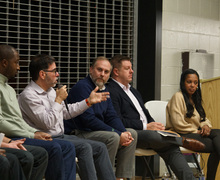Year in sports: How Pearl Washington influenced the Big East and college basketball
Liam Sheehan | Asst. Photo Editor
The Syracuse men's basketball team honored Dwayne "Pearl" Washington with shirts while he battled cancer. He was one of the best players in SU history.
The words still sting for many Syracuse fans. For most they symbolize a final failure, the inability to send Manley Field House out on a high note after Syracuse head coach Jim Boeheim won his first 51 games there.
But when then-Georgetown head coach John Thompson Jr. said, “Manley Field House is officially closed,” he set everything in motion. A rivalry for years to come. A meaningful game in every Big East season regardless of whether the teams were ranked. A seemingly pure hatred.
And yet that became a positive for Syracuse. Without those words, the Big East would have been a shell of what it was. It put Dwayne “Pearl” Washington and Patrick Ewing on a stage battling in front of 30,000 fans as well as many more sitting on their couches. In the end, history pitted Washington and Syracuse against a program 239 miles away and six words apart.
“People wanted to watch him, the Dome was relatively new,” Boeheim said. “I don’t know the numbers, but when Pearl came, the numbers changed and people wanted to come to see him play. They wanted to come to see Syracuse, but they wanted to come to see Pearl Washington.”
Since his cancer returned last summer, Washington had been remembered via T-shirts, donations and prayers. He’s not only regarded as a game changer for Syracuse, but also college basketball and the Big East. Chris Mullin, Ewing and Washington served as the Big East’s ambassadors and as a reason to show basketball games on television.
Regular season games started being televised by ESPN in 1980, the same year the Carrier Dome opened its doors. Just three years later, Washington started his storied career at Syracuse and brought SU’s average attendance from 20,401 in 1982-83 to 22,343 in 1983-84. By the end of Washington’s junior year, an average of 23,914 fans attended Syracuse basketball games.
With ESPN, all those games, they became national games. Instead of having those games on Saturdays that was a national game on CBS or ABC, all of a sudden there was three Big East games during the week that were televised nationally. Pearl became national.Former Boston College head coach Gary Williams
By the time Washington, Mullin and Ewing had left their collective mark on college basketball, ESPN had grown from a fledgling television network into a full-blown powerhouse. In the 1986-87 season on Jan. 5, the season after Washington left for the NBA, the network debuted Big Monday. The TV event became a regular spot to air primetime college basketball games, something that wouldn’t have been televised in primetime just eight years prior.
The 1987 NCAA Tournament ended with two Final Four teams coming from the Big East. Two years prior, in the 1985 NCAA Tournament, three of the Final Four teams — St. John’s, Villanova and Georgetown — came from the Big East. The eighth-seeded Wildcats and first-seeded Hoyas went on to play against each other in the championship game.

Daily Orange File Photo
What made those teams so appealing was the star power each held. There were other Big East teams with future NBA players. Boston College, the team Washington drilled his famous half-court game-winning shot against, had players whose professional careers lasted far longer than his.
But what made Washington so memorable was his on-court flair, a smile that still sticks in ESPN color commentator Dick Vitale’s head and the former SU point guard’s ability to shake and bake his way to the basket.
“He was just absolutely special, I felt that he was the one big time key recruit in the era of Jim Boeheim,” Vitale said. “ … It was like a rock concert. When he had the basketball in his hands and he was coming up the court in those Big East battles on Monday nights, they were so filled with talent. … It was as good as it gets and Pearl was the show, it was like seeing Springsteen in concert.”
In the same way that Boehiem and his two sons stay up until 10:30 p.m. to watch Stephen Curry play, people used to make the same effort to watch Washington play, Boeheim said.
Yet Washington never directly reaped the benefits of the progress he made. Boeheim credits Washington with being the start of the program’s success and making it attractive to players like Derrick Coleman and Carmelo Anthony, but the former SU point guard never played past the Sweet 16.
His excitement, what he did on the court that’s what got people excited about Syracuse basketball. From that everything flows … It all flows down that same path.Jim Boeheim
In the same way that Syracuse’s importance partially flows from Thompson’s words and the same way SU’s future success flows from Washington, the popularity of basketball on television does, too.
“He not only helped our program, he helped make the Big East and he helped college basketball,” Boeheim said. “He’s a guy that everybody wanted to see play.”
Published on April 26, 2016 at 11:24 pm
Contact Chris: cjlibona@syr.edu | @ChrisLibonati





